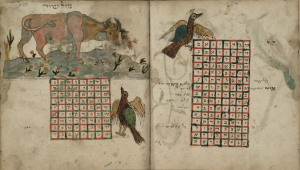This is an archive of prayers and songs written for, or relevant to, Rosh Ḥodesh Iyyar, the second month in the Jewish calendar.
Click here to contribute a public reading you have written or selected for Rosh Ḥodesh Iyyar.
⤷ You are here:
🖖︎ Prayers & Praxes —⟶ 🌔︎ Prayers for the Moon, Month, and Festival Calendar —⟶ Prayers for the Moon's Renewal —⟶ Rosh Ḥodesh Iyyar (אִיָּר) 🡄 (Previous category) :: 📁 Rosh Ḥodesh Nisan (נִיסָן) 📁 Rosh Ḥodesh Sivan (סִיוָן) :: (Next Category) 🡆 Rosh Ḥodesh Iyyar (אִיָּר)This is an archive of prayers and songs written for, or relevant to, Rosh Ḥodesh Iyyar, the second month in the Jewish calendar. Click here to contribute a public reading you have written or selected for Rosh Ḥodesh Iyyar. Filter resources by Collaborator Name Jacob Chatinover (translation) | Isaac Gantwerk Mayer (translation) | Isaac Gantwerk Mayer (transcription & naqdanut) | David Seidenberg | Unknown | Aharon N. Varady (translation) | Aharon N. Varady (transcription) Filter resources by Tag acrostic | Alphabetic Acrostic | apocryphal psalms | Cairo Geniza | eco-conscious | ecoḥasid | four worlds | In the merit of Miriam | Jewish Women's Prayers | Leah | Manna | Mazal Shor | Miriam | Miriam's well | Needing Source Images | new moon | Nusaḥ Ha-Ari z"l | paraliturgical birkat haḥodesh | paraliturgical teḥinot | school of the ARI z"l | שבת מבורכים shabbat mevorkhim | Shevet Issachar | Taurus | תחינות teḥinot | the second month | תחינות tkhines | Trees | Yiddish vernacular prayer | 19th century C.E. | 57th century A.M. Filter resources by Category the Dry Season (Spring & Summer) | Rosh Ḥodesh Marḥeshvan (מַרְחֶשְׁוָן) | Rosh Ḥodesh Nisan (נִיסָן) | Pesaḥ | Second Temple Period | Shabbat Məvorkhim | Rosh Ḥodesh Tishrei (תִּשְׁרֵי) Filter resources by Language Filter resources by Date Range Looking for something else? For prayers composed for Rosh Ḥodesh in general, visit here. For public readings selected for Rosh Ḥodesh, visit here. Resources filtered by CATEGORY: “Pesaḥ” (clear filter) Sorted Chronologically (old to new). Sort most recent first? When the spring (Aviv) season arrives, a blessing is traditionally said when one is in view of at least two flowering fruit trees. In the northern hemisphere, it can be said anytime through the end of the month of Nissan (though it can still be said in Iyar). For those who live in the southern hemisphere, the blessing can be said during the month of Tishrei. . . . Categories: the Dry Season (Spring & Summer), Pesaḥ, Rosh Ḥodesh Nisan (נִיסָן), Rosh Ḥodesh Iyyar (אִיָּר), Rosh Ḥodesh Tishrei (תִּשְׁרֵי), Rosh Ḥodesh Marḥeshvan (מַרְחֶשְׁוָן) Tags: eco-conscious, ecoḥasid, four worlds, Needing Source Images, Nusaḥ Ha-Ari z"l, school of the ARI z"l, Trees Contributor(s):
Stable Link:
https://opensiddur.org/index.php?cat=572
Associated Image: 
Mazal for Iyyar - Bull/Shor (a/k/a Taurus)
from Sefer Evronot (Halberstadt 1716)
by Pinchas ben Avraham Halevi (SeGaL) (This image is set to automatically show as the "featured image" in shared links on social media.)
Terms of Use:
Be a mentsch (a conscientious, considerate person) and adhere to the following guidelines:
Additional Notes:
Support this work:
The Open Siddur Project is a volunteer-driven, non-profit, non-commercial, non-denominational, non-prescriptive, gratis & libre Open Access archive of contemplative praxes, liturgical readings, and Jewish prayer literature (historic and contemporary, familiar and obscure) composed in every era, region, and language Jews have ever prayed. Our goal is to provide a platform for sharing open-source resources, tools, and content for individuals and communities crafting their own prayerbook (siddur). Through this we hope to empower personal autonomy, preserve customs, and foster creativity in religious culture.
ויהי נעם אדני אלהינו עלינו ומעשה ידינו כוננה עלינו ומעשה ידינו כוננהו "May the pleasantness of אדֹני our elo’ah be upon us; may our handiwork be established for us — our handiwork, may it be established." –Psalms 90:17
| ||
Sign up for a summary of new resources shared by contributors each week
  |
